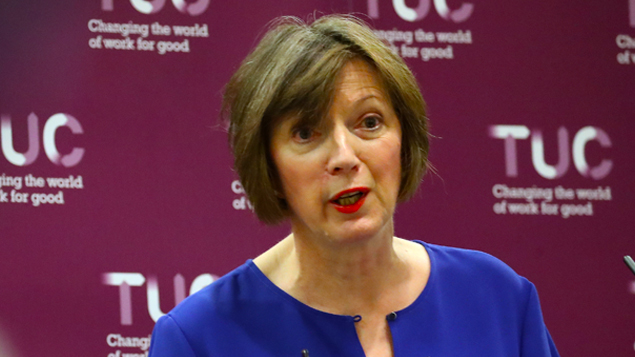[ad_1]

TUC general secretary Frances O’Grady Andrew Matthews/PA Archive/PA Images
Two in five workers will be unable to pay their bills if they have to self-isolate for two weeks on the current rate of statutory sick pay.
Revealing its survey results ahead of the union body’s annual congress, TUC general secretary Frances O’Grady called on the government to “fix this gaping hole in our safety net” to ensure employees are not faced with choosing between their job or their health amid increasing coronavirus infections and new restrictions on socialising in England.
It called on the government to increase the rate of SSP from £95.85 to £320 per week – which is equivalent to the “real” Living Wage as recommended by the Living Wage Foundation.
O’Grady said: “We all want NHS Test and Trace to work. It’s crucial for stopping the spread of Covid-19 and for getting our economy back on its feet. But the lack of decent sick pay puts everything at risk. Asking workers to self-isolate on £96 a week is not viable – especially when many don’t have savings to fall back on.
“We can’t have a situation where people are forced to choose between their health and paying their bills.
“Employers must do their civic duty and make sure workers can self-isolate on full pay. But where bosses can’t or won’t the government must step in.”
A survey for the TUC by BritainThinks found that 43% of workers would fall into financial hardship if they had to self-isolate on the current rate of SSP.
For workers earning below £15,000 the proportion who claim they would be unable to survive for two weeks on SSP rises to 50%, and for those earning below £29,000 the proportion is 47%.
Twenty-three per cent of the people surveyed said they receive only the basic SSP if they were off sick.
The TUC also noted that a significant number of workers did not qualify for SSP as they did not meet the minimum earnings threshold, posing a further issue if they were unable to work for two weeks after testing positive for the virus.
Earlier this year, the government changed the rules for claiming SSP so that anybody who falls unwell would be able to claim it from their first day off work, rather than the fourth.
Employers have been able to claim back from HMRC any coronavirus-related SSP paid to employees since March, but the scheme has been widely criticised for only being made available to firms with fewer than 250 staff.
Recruitment firms in particular wanted to see the scheme extended to larger organisations, as many were having to cover the cost of self-isolation related sickness absence for the agency staff they provided other firms.
Some 2,133 workers in England and Wales took part in the TUC’s survey between 31 July and 5 August 2020.
Employee relations opportunities on Personnel Today
Browse more Employee Relations jobs
[ad_2]
Source link





